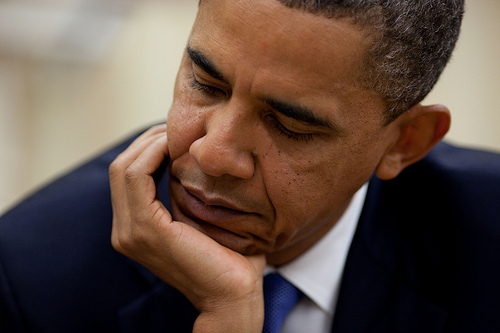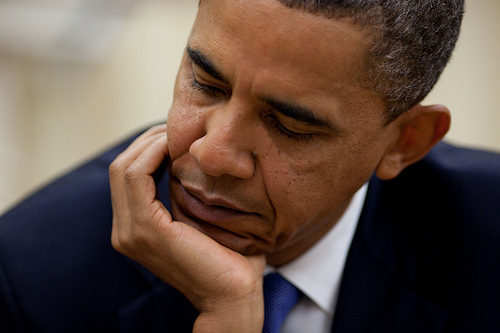 Deep in thought about saccharin.Photo: The White HouseSixteen months ago, President Obama stood in the well of Congress and issued a ringing call for a progressive vision of government. Working to persuade members of Congress to adopt health care reform, he said that “large-heartedness … is part of the American character. Our ability to stand in other people’s shoes. A recognition that we are all in this together; that when fortune turns against one of us, others are there to lend a helping hand.” Many took comfort from that vision, the first avowedly affirmative one we had heard from a president about the government he leads in many a year.
Deep in thought about saccharin.Photo: The White HouseSixteen months ago, President Obama stood in the well of Congress and issued a ringing call for a progressive vision of government. Working to persuade members of Congress to adopt health care reform, he said that “large-heartedness … is part of the American character. Our ability to stand in other people’s shoes. A recognition that we are all in this together; that when fortune turns against one of us, others are there to lend a helping hand.” Many took comfort from that vision, the first avowedly affirmative one we had heard from a president about the government he leads in many a year.
Since then, much of the president’s domestic agenda has been adopted, and a mid-term election “shellacking” has intervened. And now, President Obama, with the 2012 election drawing ever nearer, is embracing a far less generous vision. In an op-ed on the opinion pages of today’s Wall Street Journal, truly the belly of the conservative beast, the president embraces a frame for the coming discussion about the role of regulation in society that is right out of the Republican hymnal, calling for “balance” between safety and economic growth, and bemoaning regulations that sometimes “plac[e] unreasonable burdens on business — burdens that have stifled innovation and have had a chilling effect on growth and jobs.”
He also used the op-ed to announce a new initiative “to review outdated regulations that stifle job creation and make our economy less competitive.” By casting the discussion in those terms, the president swallows the GOP’s frame for the debate hook, line, and sinker.
If you listen carefully, you might hear the voices of disbelief and anguish from the families of the 11 workers killed in the Deepwater Horizon disaster, the 29 workers whose lives were extinguished at the Big Branch mine, and the nine who died after eating peanut butter crackers and similar products infected by salmonella. How about the people who knew the uncounted tens of thousands of others who were given cancer by airborne toxics at work or in the neighborhood, experienced devastating headaches because Chinese manufacturers put sulfur compounds in their drywall and no one checked the product as it crossed our borders, or were crippled by repetitive movements in a slaughterhouse or a poultry processing plant, all on President Obama’s watch? The families, friends, and coworkers of these victims of under-regulation and under-enforcement might conclude that the United States is reverting to a place where the government most definitely does not protect people who can’t protect themselves. Sure, they think to themselves as they read about the president’s new détente initiative with big business, we all need jobs, but aren’t all those billions in profits and executive bonuses enough for the business sector? Didn’t the government bailouts of the big banks do the trick?
Large corporations were at the bottom of all of the human damage listed above, not because they are intrinsically evil but because they cannot be trusted to regulate themselves. And given the current state of regulatory dysfunction at the agencies founded to protect the public, caused by a noxious mix of underfunding, political attacks, and lack of effective enforcement authority, that’s exactly what they’re doing way too much, almost everywhere you look.
To be sure, public anger and distrust, coupled with massive campaign contributions from corporate and other sources, translated into Republican triumph electorally, and the big companies who brought us the Gulf spill, the Big Branch mine collapse, tainted food, and runaway cars have now come to collect. But Barack Obama is a president from the party that should know better, the evidence of which is that he has appointed great people to lead the very agencies that so badly need rescuing after eight years of George W. Bush’s concerted efforts to de-fund and de-fang them. Instead, the president’s newly stated position diminishes EPA’s Lisa Jackson, FDA’s Margaret Hamburg, and OSHA’s David Michaels, siding instead with his regulatory czar, Cass Sunstein, who has steadily pushed to issue an executive order that throws a net over his colleagues rather than helping them do their jobs.
The principal example of outdated regulations that the president cites is the listing of saccharin as a hazardous waste. EPA removed saccharin from the list recently, a decade after the science supporting the move came together. But in the intervening years, it’s not as if there’s evidence the regulation has been costing us jobs. Companies weren’t told to dig special saccharin waste dumps to dispose of the stuff, after all. So it’s business friendly rhetoric that has the unfortunate by-product of making the agencies sound more than a little silly, but it doesn’t make the case that outdated regulations are costing us jobs. Forcing beleaguered agencies to “look back” and find more saccharin examples will have real costs, though, because they are already pushed to their limits by funding shortfalls that give them, in many cases, the same budgets in real dollars as they had in the mid-1980’s, when the White House also was hounding them to control themselves. Does the president really intend regulators to freeze-frame efforts to solve public health crises that abound all around them so that they can engage in a draining search to placate companies already rushing to Republicans in Congress with regulatory “hit lists”?
As for the argument that we need to loosen regulation in order to create jobs, the believers in this superficially appealing bit of dogma have yet to cite research showing that regulations are slowing the economic recovery. They just serve up the assertion, in part to distract us from the hard reality that it was deregulatory fervor that got us into this mess in the first place. And while President Obama may not accept it, he’s apparently willing to let the debate be conducted in those terms.




